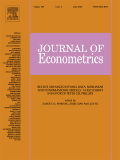
Journal of Econometrics
Scope & Guideline
Driving Excellence in Econometric Scholarship Since 1973.
Introduction
Aims and Scopes
- Methodological Innovations:
The journal emphasizes the development of new econometric techniques and models that enhance the analysis of economic data, including advancements in time series analysis, panel data models, and causal inference. - Empirical Applications:
A significant focus is placed on applying econometric methods to real-world economic issues, including labor economics, finance, and public policy, providing insights that are both theoretically sound and practically relevant. - Theoretical Contributions:
Contributions that advance the theoretical underpinnings of econometric models are highly valued, particularly those that address identification issues, estimation techniques, and asymptotic theory. - Interdisciplinary Approaches:
The journal encourages interdisciplinary research that incorporates ideas and methods from statistics, machine learning, and data science to enhance econometric practices. - Robustness and Reliability:
A core aim is to ensure that econometric methodologies yield robust and reliable results, accounting for various forms of data irregularities and model uncertainties.
Trending and Emerging
- Machine Learning Integration:
There is a growing trend towards integrating machine learning techniques with traditional econometric methods, enhancing predictive accuracy and providing new insights into complex economic phenomena. - Causal Inference Techniques:
Research focusing on causal inference, particularly in observational studies, has gained prominence, reflecting the field's response to the need for robust methodologies that can identify causal relationships amidst confounding variables. - High-Dimensional Data Analysis:
The analysis of high-dimensional datasets, including applications in finance and social sciences, is increasingly prevalent, addressing the challenges of overfitting and model selection in complex data environments. - Dynamic Modeling Approaches:
Dynamic econometric models that capture temporal dependencies and structural changes are emerging as a focal point of research, particularly in light of recent economic shocks like the COVID-19 pandemic. - Network Econometrics:
There is a rising interest in network econometrics, exploring the interconnectedness of economic agents and the implications for policy and economic outcomes in a globalized world.
Declining or Waning
- Traditional Linear Models:
There has been a noticeable decrease in the publication of papers focusing on classical linear regression models as the field moves towards more complex, non-linear, and high-dimensional modeling techniques. - Basic Econometric Theory:
Papers that primarily discuss foundational econometric theory without significant application or methodological innovation are becoming less frequent, as the emphasis shifts towards practical applications and advanced techniques. - Simple Hypothesis Testing:
Research centered on basic hypothesis testing frameworks seems to be declining, likely due to the increasing complexity of data and the need for more sophisticated testing methods that accommodate high-dimensional settings. - Static Panel Data Models:
The use of static panel data models is diminishing as researchers increasingly adopt dynamic models that better capture the evolving nature of economic relationships over time. - Descriptive Econometrics:
There is a waning interest in purely descriptive econometrics that lacks robust theoretical or methodological frameworks, as the field increasingly prioritizes inferential and predictive analytics.
Similar Journals
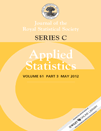
JOURNAL OF THE ROYAL STATISTICAL SOCIETY SERIES C-APPLIED STATISTICS
Exploring the Frontiers of Applied Statistical ResearchThe JOURNAL OF THE ROYAL STATISTICAL SOCIETY SERIES C - APPLIED STATISTICS, published by the Oxford University Press, serves as a critical platform for disseminating innovative research within the field of applied statistics. With its ISSN 0035-9254 and E-ISSN 1467-9876, this journal provides a comprehensive resource for statisticians and practitioners alike, focusing on the development and application of statistical methodologies to real-world problems. As of 2023, it is ranked in the Q2 quartile within both the Statistics and Probability categories, reflecting its significant contribution to the discipline as evidenced by its Scopus ranking. Although it does not offer open access, the journal maintains a rigorous peer-review process and publishes issues regularly, with coverage extending from 1981 to 2024. By focusing on practical applications of statistical methods, the journal aims to bridge the gap between theory and application, making it an essential read for researchers, professionals, and students who are keen on advancing their understanding of statistics in various domains.

International Journal of Applied Mathematics & Statistics
Innovating Insights for Real-World Statistical ChallengesThe International Journal of Applied Mathematics & Statistics, published by the CENTRE ENVIRONMENT SOCIAL & ECONOMIC RESEARCH PUBL-CESER, is a vital platform for researchers and professionals dedicated to advancements in the field of applied mathematics and its statistical applications. With an ISSN of 0973-1377 and an E-ISSN of 0973-7545, this journal presents innovative research from 2003 to 2013, offering insights into various mathematical techniques and statistical methodologies fundamental for solving real-world problems. Although its coverage in Scopus has been discontinued, the journal remains relevant within its scholarly community, emphasizing the importance of collaborative research and interdisciplinary approaches for tackling complex societal challenges. Its commitment to promoting qualitative and quantitative research makes it an invaluable resource for students and professionals aiming to enrich their expertise and contribute to ongoing developments in applied mathematics and statistics.
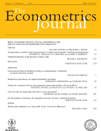
Econometrics Journal
Exploring New Frontiers in Economic MethodologiesEconometrics Journal, published by Oxford University Press, stands as a premier outlet for original research in the fields of Economics and Econometrics, boasting a commendable 2023 Q1 ranking within its category and an impressive 69th percentile rank in Scopus. Since its inception in 2006, the journal has consistently provided a platform for innovative methodologies and applications that contribute to the advancement of econometric theory and practice. With a focus on high-quality, peer-reviewed articles, the journal serves as a vital resource for researchers, professionals, and students alike, facilitating the dissemination of cutting-edge insights that push the boundaries of knowledge in economic analysis. Although it operates under a traditional subscription model, the journal's commitment to excellence and relevance in modern economic discourse positions it as an essential reference for those seeking to navigate the complexities of econometric research.

Chilean Journal of Statistics
Exploring the frontiers of statistical methodologies.The Chilean Journal of Statistics is a vital resource for researchers, professionals, and students dedicated to the field of statistics and probability. Published by SOC CHILENA ESTADISTICA-SOCHE, this journal serves as a platform for the dissemination of innovative research and advancements in statistical methodologies, data analysis, and applications. With an ISSN of 0718-7912 and E-ISSN 0718-7920, the journal features contributions from the statistical community in Chile and beyond, reflecting its growing influence as evidenced by its classification in the Q3 quartile for 2023. Operating out of Chile, specifically from Santiago, the journal aims to converge its scope from 2019 to 2024 on providing high-quality, peer-reviewed articles that can inform and inspire academic and professional practices. While it is not an open-access journal, it remains a crucial outlet for impactful statistical research, fostering a deeper understanding of statistical concepts and their real-world applications.
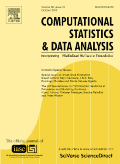
COMPUTATIONAL STATISTICS & DATA ANALYSIS
Unlocking Insights Through Rigorous Statistical MethodsCOMPUTATIONAL STATISTICS & DATA ANALYSIS, published by Elsevier, is a leading academic journal that has made significant contributions to the fields of Applied Mathematics, Computational Mathematics, Computational Theory and Mathematics, and Statistics and Probability. With an impressive ranking of Q1 in multiple categories, this journal stands at the forefront of scholarly research and innovation. Leveraging its digital accessibility through E-ISSN 1872-7352, the journal facilitates the dissemination of high-quality research findings and methodologies essential for advancing statistical techniques and data analysis applications. Operating from its base in Amsterdam, Netherlands, the journal features rigorous peer-reviewed articles that cater to a diverse readership including researchers, professionals, and students. As a vital resource for cutting-edge developments from 1983 to its ongoing publication in 2025, COMPUTATIONAL STATISTICS & DATA ANALYSIS continues to foster academic discourse and propel the field forward, ensuring that emerging trends and established theories are effectively communicated to the scientific community.
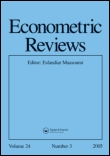
Econometric Reviews
Advancing Economic Insights Through Rigorous AnalysisEconometric Reviews, published by Taylor & Francis Inc, is a premier journal in the field of Economics and Econometrics, recognized for its significant contributions to the advancement of economic theory and practice since its inception. With its ISSN 0747-4938 and E-ISSN 1532-4168, the journal has maintained a consistent publication record from 1982 to 2024, offering a platform for groundbreaking research that shapes the landscape of quantitative economic analysis. With a proud place in the Q1 category for Economics and Econometrics as of 2023, it stands as a critical resource for scholars, practitioners, and students alike, actively engaging with themes such as econometric methods, theory, and policy implications. Although operating under a subscription model, the journal’s high impact factor reflects its esteem within the academic community, fostering a rich dialogue among researchers in this evolving discipline. The journal’s office is located at 530 Walnut Street, Ste 850, Philadelphia, PA 19106, USA, forging connections in one of the central hubs of economic research.

Thailand Statistician
Catalyzing Innovation in Statistics and ProbabilityThailand Statistician, published by the THAI STATISTICAL ASSOCIATION, is a pivotal journal in the realms of computational mathematics and statistics. With an ISSN of 1685-9057 and an E-ISSN of 2351-0676, this journal aims to disseminate high-quality research and innovative methodologies that advance the fields of statistics and probability. Covering a range of topics from theoretical statistics to applied computational techniques, it provides a platform for researchers, professionals, and students in Thailand and beyond to contribute their findings and insights. The journal has been gaining recognition, boasting a Scopus ranking of Q3 in Computational Mathematics and Q4 in Statistics and Probability as of 2023. With its commitment to open access, the Thailand Statistician stands as an essential resource for those striving to stay abreast of advancements in statistical methodologies and their applications, fostering the growth of statistical science in the region and globally.
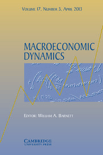
MACROECONOMIC DYNAMICS
Pioneering Research for Informed Economic PoliciesMACROECONOMIC DYNAMICS, a distinguished academic journal published by Cambridge University Press, serves as a pivotal platform for innovative research in the fields of economics and econometrics. With its ISSN 1365-1005 and E-ISSN 1469-8056, the journal has been at the forefront of scholarly communication since its inception in 1997, offering an extensive range of articles that explore dynamic economic models, policy impacts, and theoretical advancements through the latest empirical analyses. Currently holding a Q2 ranking within the 2023 Economics and Econometrics category, and positioned at rank #409 out of 716 within Scopus, it is an essential resource for researchers, professionals, and students alike, looking to stay updated on critical developments in macroeconomic theory and practice. Although it follows a traditional subscription model rather than Open Access, the journal continually strives to disseminate high-quality, peer-reviewed content that informs and inspires the global economics community. The importance of MACROECONOMIC DYNAMICS lies in its commitment to fostering a deeper understanding of economic phenomena, making it a must-read for anyone engaged in the complexities of the economic landscape.
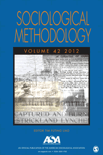
Sociological Methodology
Empowering research with rigorous methodological frameworks.Sociological Methodology is a premier journal published by SAGE Publications Inc that serves as a vital platform for advancing the field of sociology through innovative methodological approaches. Since its inception, this esteemed journal has provided a rigorous forum for empirical and theoretical contributions in sociological research, making it an essential resource for both established scholars and emerging researchers. With an impressive Q1 ranking in both Social Sciences and Sociology and Political Science, as well as a notable position in the Scopus rankings, the journal ensures that published works meet the highest academic standards. Although it does not offer open access, its contributions have a significant impact on the field, and it enriches interdisciplinary dialogues through its diverse scope. The journal emphasizes the importance of methodological rigor and the application of cutting-edge techniques to address complex social issues, thereby shaping contemporary sociological discourse. Located in the United Kingdom, Sociological Methodology is dedicated to fostering scholarly communication and driving forward innovative research that challenges conventional paradigms.

Econometrics
Unlocking the Potential of Econometric MethodsEconometrics, published by MDPI, is a prominent open access journal based in Switzerland, dedicated to advancing research in the fields of economics and econometrics. Since its inception in 2013, this journal has been pivotal in disseminating innovative theories and empirical findings, fostering an engaging dialogue among scholars and practitioners. With an impressive Q2 ranking in the 2023 category of Economics and Econometrics and a solid position at #378 out of 716 in Scopus rankings, it stands as a vital resource for those seeking to enhance their understanding and application of econometric methods. The journal offers immediate open access to its published articles, ensuring that researchers, professionals, and students alike can easily access and contribute to the evolving body of knowledge in this essential discipline. The scope of Econometrics encourages submissions that cover a broad array of topics, making it a dynamic platform for innovative research until 2024 and beyond.